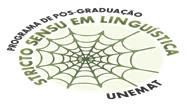Banca de DEFESA: MARIA NORMA LOPES SOUZA SILVA
Uma banca de DEFESA de DOUTORADO foi cadastrada pelo programa.DISCENTE : MARIA NORMA LOPES SOUZA SILVA
DATA : 07/12/2022
HORA: 13:00
LOCAL: remota google meet
TÍTULO:
THE CONSTITUTION OF THE AUTHORSHIP OF THE DEAF SUBJECT IN CHILDREN'S LITERARY WORKS
PALAVRAS-CHAVES:
Authorship; Deaf subject; Libras; Speech Analysis.
PÁGINAS: 165
GRANDE ÁREA: Lingüística, Letras e Artes
ÁREA: Lingüística
RESUMO:
This thesis, included in the research line Studies of Discursive Processes, of the Stricto Sensu Postgraduate Program in Linguistics at the Federal University of Estado de Mato Grosso (PPGL/UNEMAT), affiliated with the Materialist Discourse Analysis, formulated by Pêcheux and other researchers, in France, and initially developed by Eni Orlandi, in Brazil, it aims to understand the functioning of the authorship of the deaf subject in the deaf literature produced in Portuguese. In this way, we formulate the following questions: What makes the production of deaf literature written in Portuguese possible and what makes it possible? How are Libras and the deaf subject signified, symbolized in this space of interpretation that is deaf literary discursivity? What is the imaginary projection of your readership? Thus, from these and other questions we built our corpus, analyzing the linguistic/discursive materialities that comprise deaf Cinderella (HESSEL; ROSA; KARNOPP, 2003a), deaf Rapunzel (SILVEIRA; ROSA; KARNOPP, 2003b), Adam and Eve (KARNOPP; ROSA, 2005a) and Patinho Surdo (KARNOPP; ROSA, 2005b), were produced during the officialization process, which lasted from 2002 (year of the Libras Law) to 2005 (year of regulation of the law through Decree nº. 5626/ 2005) and in the sequel, Santa Claus' magic gloves (KLEIN; MOURÃO, 2012), A fable of Noah's ark (MOURÃO, 2014) and The Christmas stars (KLEIN; STROBEL, 2015), which were produced after Institutionalization. of the undergraduate course in Letters-Libras that began in 2006.Throughout our work, we understand that the peculiar functioning of the authorship of deaf subjects in deaf literature written in Portuguese takes place in the presence of the hearing subject as a necessary condition for the production of meanings. These authors seek to make Libras known, to give visibility to the difference, without erasing it. Although, language policies point in the opposite direction, legitimizing only the standard written form, Portuguese as the official language; the entire text is showing Libras as a significant materiality that appears as marks, materialized in colors, in signed drawings, in the writing of signs, in the verbal of the Portuguese language, among others. In this way, the authors imaginatively project the place of this other, the reader, by bringing Libras as a significant materiality. There we have the identification process, the reader-effect: the hearing reader will know a little more about this language and about the subject who speaks it, and the deaf subject will identify when he sees the marks of Libras. This reader effect is considered when constructing authorship. Thus, the deaf subject occupies a position and means himself in/through the language; and it is through it, the language, that he becomes a subject of saying, an enunciating subject. He ceases to be that subject who is spoken and starts to occupy the position of author, of the one who writes.
MEMBROS DA BANCA:
Presidente - 101625005 - FLAVIO ROBERTO GOMES BENITES
Interno - 55846009 - JOELMA APARECIDA BRESSANIN
Externo ao Programa -
Externo à Instituição - ANGELA CORREA FERREIRA BAALBAKI - UERJ
Externo à Instituição - ILKA DE OLIVEIRA MOTA - UFSCAR



